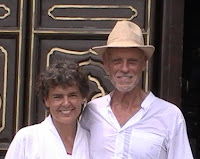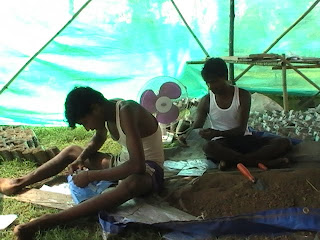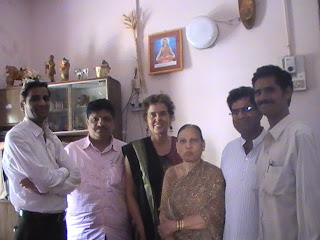Full of happiness and anticipation, we bumped along the rough dirt and gravel pathway on our way to the secondary school at Kelthan
to give a check for
5750 rupies (about US $ 125) to a young man who couldn’t afford to go to college. His name and particulars:
Prafull Chandrakant Tumbada, age 19, a slender, clean looking, keen minded person of good manners and respectful presence - - handsome and quiet, but attentive and quick to respond to queries about his life and intents. Yes, we liked him immediately and our appreciation of him only grew as we got to know him better.
Oh, yes, his intent! He intends to become a primary grades teacher, and we think a fine one at that.
.jpg)
We arrived, bones a bit shaken by the bumpy rickshaw ride, at the
Saraswati Secondary School, and our first impressions were of a clean, well organized building and grounds - - a favourable start. We were met by Prafull, his champion Ragesh, the self appointed and very capable social worker of the village, and some of the staff of the school. Quickly we were ushered along the enclosed porch way to the Principal’s office where we met Mr. Vijay Patil, a trim, medium height, clean and organized man who spoke good English and began to give us information about his school and the 175 students in attendance. In the first picture above, from left to right, you see Ragesh, Prafull, The Principal Vijay, Dewa, and Jeanetta (from SNET).
.jpg)
The 175 students divided into three grades of 8, 9, and 10 mean that the classes each contained 55 to 65 students. In the photo to the side, you are viewing only the left half of the room full of students. Having been a school teacher myself for a number of years and having complained about 30 students per class being impossible to teach effectively, I immediately recognized the difficulty of their mission. The fact that Prafull had managed to score in the top percentile of Indian testing for his grade level under such conditions speaks highly of his determination and intelligence.
We queried the principal about whether the teachers were paid. He said, "yes since 2007",
but for the 7 years previous to 2007, they received no pay. We marvelled at their devotion for teaching without remuneration for so long. Did they have text books? Yes, most student had text books provided by their parents, but the books are getting much more expensive and
now cost almost $2 US so that some children could not afford books. Also we heard that there were no work books for question and response where the understanding of each student could be checked and corrected.
.jpg)
As for hygiene, the principal volunteered that they had a “bore well,” a drilled well of 40 feet depth, but which was now padlocked and unused because of water contamination from the monsoon waters infiltrating the system. Later, observing the well, we noticed that the concrete around the well pipe was cracked and would leak surface monsoon water down into the well. A staff member brought the long cylindrical well bucket and lowered it on a rope into the well. Cranking the bucket up again to the top, we saw water leaking from the bucket and at the top was brown dirty water with organic growth floating on the surface. The water was obviously unfit for consumption.The principal told that the students, if they wanted water, had to bring it from home, and that this water was often polluted so that students were then sick.
The principal requested that SNET give them several water filters to provide potable water for the school. We replied that we thought SNET could do that.
.jpg)
Our conversation was divinely interrupted by a beautiful chorus of young voices singing a morning prayer. We peaked out onto the porch and took the snap you see of the circle of girls singing the morning devotion. Everything and everyone stopped for these quiet and blissful moments. It was truly gorgeous.
.jpg)
Asked about bathrooms, they pointed to a small building nearby and
explained that there was a boy and a girl side to the bathrooms. Neither side had a door or a curtain for privacy, and the girls side appeared to be unused due to lack of privacy. The boys’ side had three urinal stalls and was obviously used. We have read reports that girls in India tend to quit school early because they don't have adequate bathrooms and have to walk far away from the school to relieve themselves in bushes. Thus lack of bathrooms is a deterrent to more girls finishing school
SNET's project of giving away food bearing trees to the local villagers came up and the principal quickly volunteered that each student could be given a tree to care for, and that the quite healthy trees which we saw at the property boundaries were cared for by the students. This concept could, we mused, quickly evolve into a process/dynamic where the students learn to husband food bearing trees, and take this knowledge home with them to grow trees at their homes. We also have a project in mind where children could learn to farm by creating small plots at school, by learning to save and share the seeds, and to treasure the traditional non-hybrid seeds now controlled by and exploited by the large international corporations. We believe it is clear that Indian villagers must take back the ownership of their own seed lines and organic fertilizers - - to be independent of international external controls. Starting with the children who bring it home to the families seems a sterling approach.
We did learn that a young girl who scored 3rd in her class last year, was unable to attend science school due to lack of money. Jeanetta, for one, cannot stand to see highly deserving young girls like this be disadvantaged and I am sure she will find others who want to help the girl go after her science degree.
Please notice the adjacent picture of the long computer desk in the computer lab. You don't see the computers? Well, neither did we and what a really great possibility for helping a lot of eager young minds lead by a well organized and obviously capable School Head Master, Mr. Patil. He's got the room, he's got the desk, he says he can keep it open 7 days a week - - he needs some computers, new or used. These computers will help these students leap into the 21 century and catch up with the rest of the world. Let's figure out how to help him and his students! Ideas and resources please!
We visited this school with the intention of offering conversational English classes to the teachers and other adults. After living here for almost two years, it has become clear that for children to speak English well and with confidence, their teachers need to be able to model this. Even a teacher we know who speaks very good English was shy to speak English with us when we first met her. Although she had been studying English for almost 15 years, she had never spoken to an English speaking westerner. After she spent some time with us, she got over her reticence to use her very capable skills at speaking English. But if she feels this way, then what about all the other teachers in the area who have even less training than she has? The Principal and other teachers as well as students would like to learn English with correct pronunciation, and we are discussing how we can organize times to make this happen.
In summary, we are quite grateful to be lead by Prayful’s need to this village and school of even greater need where we as agents of SNET can most likely have a profoundly beneficial effect. We believe we can find computers for this school, and English teaching software as well as for Hindi/Marathi languages. We can help with English conversation for the teachers and students, and provide water filters for them, begin a farming-food-independence program with the children, seal their well from surface contamination, provide booklets for their writings and learning exercises, start a resource library of school books, and at a minimum get a curtain for the girls bathroom. We look forward to a very positive adventure in education with this school and their organized and effective staff.
Stay tuned for how we can all have fun helping these youngsters and staff. Ideas and resources Please!!










b.JPG)
.jpg)
.jpg)
.jpg)
.jpg)
.jpg)
.jpg)























